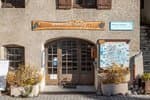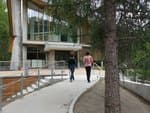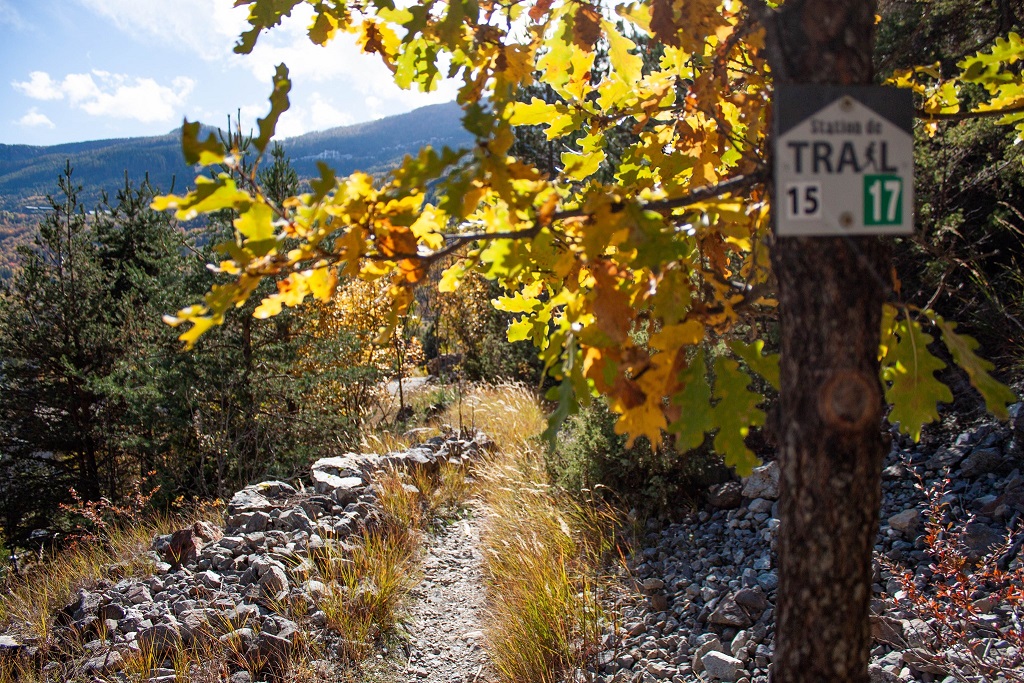
The Balade du Pêcheur - Fisherman's Trail (trail route no. 17)
“This route is simple and short, but running or walking along the water's edge definitely has calming virtues. You follow the path with the sound of the mountain stream close by, to hear a pebble roll or the metallic cry of a dipper.” Marie-Geneviève Nicolas, park ranger at the Parc National des Écrins
Description
The route starts outside the Camping Huttopia de Vallouise. Take the track leading up the left-hand bank of the Gyr towards Pelvoux.
- At the bridge, the Pont de Vallouise, continue right and cross the Gyr and then go left as you exit the bridge.
- Cross a wide footbridge and, on the hairpin bend in the track, take a path running below a stable and shortly after this take the path on the left for Vallouise.
- On the road above the church, you come back to your starting point.
- Departure : Camping Huttopia, Vallouise
- Arrival : Camping Huttopia, Vallouise
- Towns crossed : Vallouise-Pelvoux
Altimetric profile
Recommandations
Before setting off, it is very important to check the opening periods for this route on the website: https://stationdetrail.com/fr/stations/le-pays-des-ecrins/parcours
Share your photographs on social networks with #stationdetrailecrins
Check weather conditions before setting off.
Rescue services contact details: Secours Montagne (Mountain Rescue): +33 (0)4 92 22 22 22 or 112
Show consideration for the work of farmers, livestock keepers and owners
Close all gates behind you
Take your litter home
Do not take shortcuts across pastureland
The trail routes are also suitable for walking
Information desks
Place de l'Eglise, 05340 Vallouise
Vallouise Park house
, 05290 Vallouise
Information, documentation, models, exhibitions, screenings, product sales and works of the Park. Guided tours for school, reservation required. The new Park House opened in Vallouise since June 1, and offers visitors an interactive permanent exhibition inviting to explore the area and its heritage. A temporary exhibition space will allow a renewed offer. Finally, the device is completed by an audiovisual room to organize screenings and conferences Free admission. All animations of the Park are free unless otherwise stated.
Transport
Public transport >> www.pacamobilite.fr
Consider car-sharing >> www.blablacar.fr
For more information, ask at the Tourist Information Office nearest to the trail starting point.
Access and parking
10 km from L'Argentière-La Bessée, take the D994E.
Parking :
8 points of interest
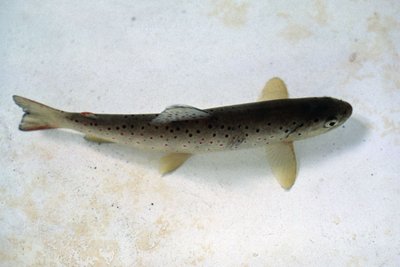
La truite fario - Parc national des Écrins  Fauna
FaunaThe trout
But what's the angler angling for? The brown trout of course! This is the mountain fish par excellence, with a streamlined body to withstand the current more efficiently and light brown skin speckled with black and red. It lives in cold, oxygen-rich waters.
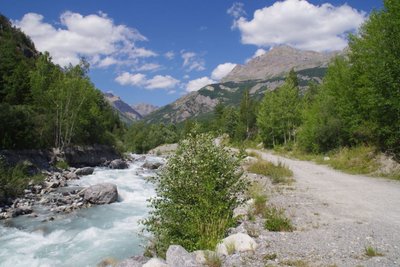
Forêt au bord du Gyr - Office de tourisme Pays des Écrins  Flora
FloraForest on the water's edge
This small wood is a fragment of the riparian forest: natural forest growing adjacent to a body of water. Reduced everywhere due to urbanisation, this type of forest is made up of alder, willow and oak, and also poplar, birch and aspen, among others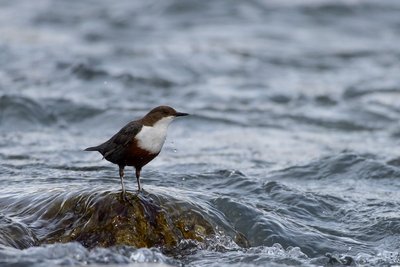
Cincle plongeur - Mireille Coulon - Parc national des Ecrins  Fauna
FaunaThe white-throated dipper
Perched on a rock in the middle of the river, a squat bird with a short tail, brown with a large white bib, bobs up and down with his tail in the air. He then dives and only reappears a few moments later. This is how this bird hunts, diving into the water and then walking against the current along the river bed searching for aquatic insect larvae, small crustaceans or small fish, lifting pebbles with its beak to dislodge them.
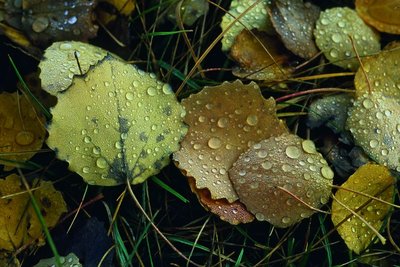
Des feuilles de tremble - Bernard Nicollet - Parc national des Écrins  Flora
FloraThe aspen
On the right, a stand of aspens with smooth, greenish trunks and rounded, crenelated leaves take on magnificent colours in autumn. The stem, or petiole, of aspen leaves is flat and twisted, so it can be caught by the slightest breeze making the foliage «quake» hence its common name, the quaking aspen.
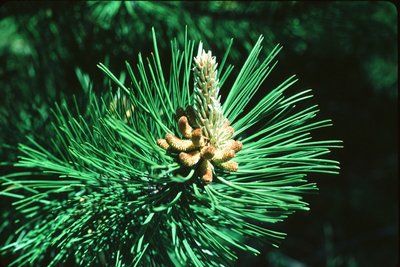
Aiguilles de pin sylvestre - Parc national des Écrins  Flora
FloraForest of pine and oak
The path now alternates between cleared areas and forested areas. This forest contains Scots pine (recognisable by its orangey coloured trunk, especially at the top), downy oak (its young branches and leaf undersides covered with a fine down), and larch. The Scots pine and downy oak are very drought-tolerant (it is very limey soil here) and can also withstand low temperatures, and they are typical of the montane zone in this part of the Alps.
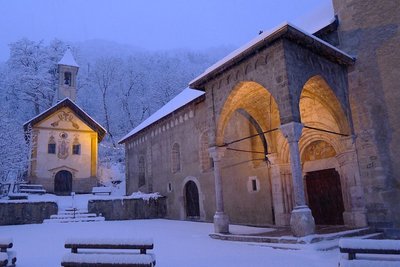
L'église Saint Etienne (à droite) et la chapelle des pénitents (à gauche) - Thierry Maillet - PNE  Architecture
ArchitectureSaint-Étienne de Vallouise Church
Listed and protected as an historic monument since 22 October 1913, the church dedicated to Saint Stephen is one of the most beautiful religious edifices in Hautes-Alpes. It is typical of the Romanesque churches in the Briançon region built in the second half of the 15th century, although its exact construction date is still uncertain.
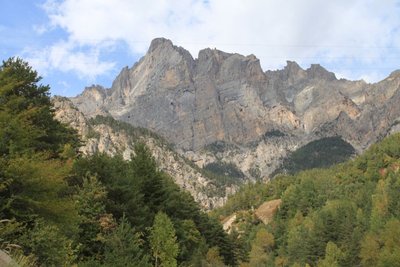
Le massif du Montbrison - Office de tourisme Pays des Écrins  Panorama
PanoramaThe Montbrison massif
The path offers a beautiful overall view of the limestone massif of Montbrison, overlooking the hamlets of Pelvoux with the peaks of the Cime de la Condamine, the Tête des Lauzières, the Pic de Montbrison and the Tête d'Amont.
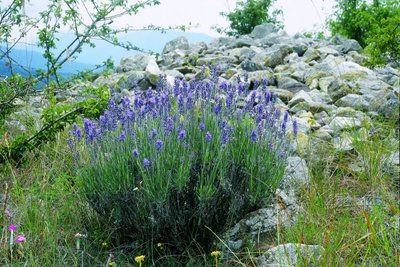
La lavande à feuilles étroites - Jean-Pierre Nicollet - Parc national des Écrins  Flora
FloraThe narrow-leaved lavender
The path crosses some limestone screes. It is a dry environment. The narrow-leaved lavender grows in sunny areas, a reminder that the Pays de Écrins is in the Southern Alps after all! Not to be confused with the lavandin, this plant naturally grows on rocky slopes in the mountains of the Midi.
Source

Report a problem or an error
If you have found an error on this page or if you have noticed any problems during your hike, please report them to us here:

